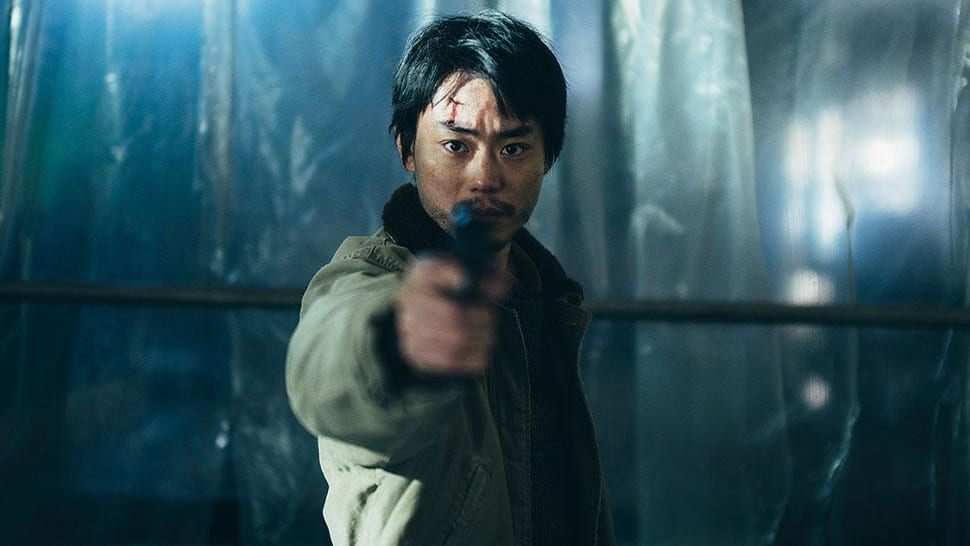VENICE, Italy—Ryôsuke Yoshii (Masaki Suda) arrives at an older man’s house. The man is trying to get rid of some therapy machines, and Yoshii graciously offers to take them off his hand for 30,000 yen. He has no idea what the devices are worth, but he’ll go off instinct and hopefully make a quick buck.
Except Yoshii is a wolf in sheep’s clothing: He knows exactly what the devices are worth, and he’s going to profit massively, selling them for 200,000 yen a piece. He works at a clothing factory, but he spends all of his free time reselling—staring at his computer screen waiting for prices to drop and opportunities to present themselves so he can pounce. Whether it’s video games, concert tickets, or limited edition figures, nothing is off limits; profit is all that matters.
Japanese filmmaker Kiyoshi Kurosawa has long been fascinated by the way tech impacts our lives, and in Cloud, which just premiered at the Venice Film Festival, he examines those people you love to hate—resellers—with spellbinding effect. At least for the first hour.
In his prolific career, which includes award-winning films like Tokyo Sonata, Cure, and Wife of a Spy, Kurosawa, who has been dubbed the “master of horror,” has developed a real knack for driving tension from the ordinary. In Cloud, which was just selected as Japan’s 2025 Oscar submission, he turns staring at a computer screen into a high-wire act, getting your heart racing without moving the camera an inch. Watching Yoshii monitor his products as they slowly sell one by one should be mundane, but Kurosawa makes it feel riveting.
Inspired by his big sale and ready to take things to the next level, Yoshii breaks off his partnership with Muroaka (Masataka Kubota) and goes solo, moving with his girlfriend Akiko (Kotone Furukawa) from their tiny Tokyo apartment to a home in the mountains. It’s an opportunity for more space and more time to connect, but more importantly, it’s a chance for Yoshii to make more than he’s ever dreamed.
Despite Yoshii’s perceived success, things are getting weird. A dead rat appears outside his apartment. One night when he heads home on his motorbike, he falls—someone has set up a wire to knock him down. But the rat could have just died there. And the wire could be for anyone. So Yoshii continues down the path where his bank account stands to benefit the most.
Kurosawa is a filmmaker who exerts great control. Shots are patient and precise, and music is extremely sparsely implemented, but each time it appears it sends a chill down your spine; something bad is about to happen. Yet he knows exactly how to prepare you for the worst. You could accurately describe Cloud as a slow burn, but it certainly doesn’t feel slow as bad omens start to pile up for Ryo to the point that he can no longer ignore them. As Kurosawa’s script carefully sets up Ryo and Akiko’s new life, it feels like only a matter of time before it crumbles.
And crumble it does. Cloud is a film about limits and extremes. What pushes us to our breaking points and beyond them, and how the internet, buoyed by the promise of anonymity, can fuel our grievances and morph them into fury. And as people’s frustrations can explode into something unpredictable, Cloud too transitions into a full-blown action movie.
This creates a jarring shift in tone, where the film’s carefully coiled mystery makes way for something louder and more frantically paced. Despite the steady build, Cloud unravels.
The shift feels extreme for extreme sake, and what happens to Ryo doesn’t feel particularly earned. It’s here that Kurosawa’s criticism of how technology can alter our minds and how mob mentality can take over in insidious ways comes to fruition, but the motivation for a lot of characters feels underdeveloped. Kurosawa creates such an eerie atmosphere in the first hour of Cloud, that watching it crumble into more generic action territory is challenging and feels like a miscalculation. It doesn’t help that much of the action in the second half isn’t particularly interesting.
What does work especially well through the entirety of Cloud is the idea that you never really know anybody else, and when push comes to shove people will be capable of things you’d never expect. While the second half of the film is sure to divide audiences with its surprising change in direction, it effectively shows how people fall or thrive under unimaginable pressure, even if it feels overlong.
Cloud is brilliant until it’s frustrating. It’s an evocatively shot exploration of how the digital world impacts us on a personal and a wider societal level. But it’s a tale of two seemingly different films, as a masterful first hour makes way for a far more pedestrian second. Performances are engaging, particularly Suda, who gives a fascinating and chillingly distanced performance as Yoshii that draws you into his world while preventing you from learning too much about him. He could be anybody—you never know who’s really behind a screen.



